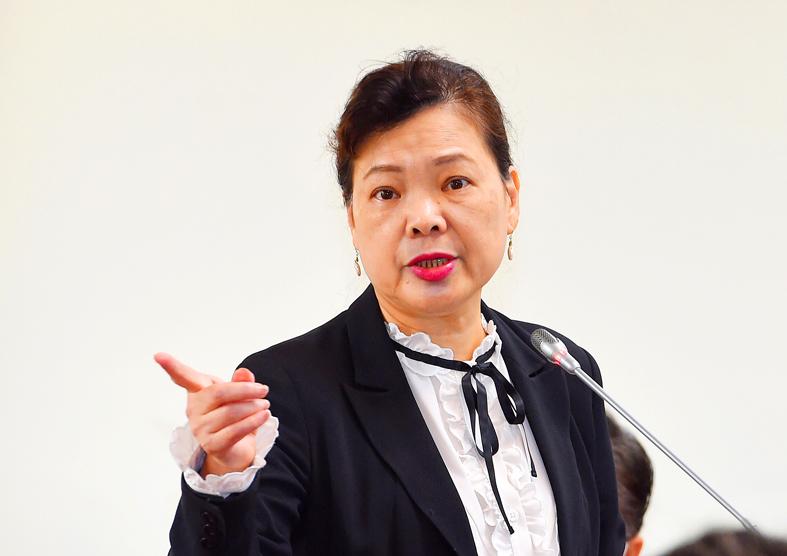Taiwan Semiconductor Manufacturing Co’s (TSMC, 台積電) most advanced technology would stay in Taiwan, Minister of Economic Affairs Wang Mei-hua (王美花) said yesterday in response to lawmakers’ queries on talks between the manufacturer and the EU.
“Regardless whether TSMC establishes production facilities or pursues cooperation in Europe, Taiwan will remain the home base for its most advanced technologies,” Wang told a joint meeting of the legislature’s Economics Committee, and Judiciary and Organic Laws and Statutes Committee.
Reuters yesterday reported that EU Commissioner for Internal Market Thierry Breton is seeking to court TSMC and other global semiconductor giants to establish chipmaking facilities in Europe.

Photo: Liu Hsin-de, Taipei Times
Tomorrow, Breton is scheduled to hold a videoconference with TSMC Europe president Maria Marced and a meeting with Intel Cop chief executive officer Pat Gelsinger in Brussels, Reuters said.
Wang played down the suggestion that TSMC might partner with the EU in its efforts to reach “chip sovereignty” with advanced nodes.
“TSMC will have to decide its global strategy and take commercial considerations into account when it comes to whether it establishes a plant in the EU,” she said.
A worldwide semiconductor shortage, which according to TSMC might persist until next year, has raised awareness of Taiwan’s pivotal role in chip supply chains.
Separately, Deputy Minister of Economic Affairs Chen Chern-chyi (陳正祺) yesterday announced that the second round of the Taiwan-US Economic Prosperity Partnership Dialogue would be held this summer.
“It’s an opportunity to foster mutual development, get on the same page in terms of trade policy and explore opportunities for cooperation,” Chen said.
The official date has not yet been announced, nor has the details of how the dialog is to be held.
During the first round of the talks in November last year, Chen led Taiwan’s delegation, while the US delegation was led by then-US undersecretary of state for economic growth, energy and the environment Keith Krach.

CHIP RACE: Three years of overbroad export controls drove foreign competitors to pursue their own AI chips, and ‘cost US taxpayers billions of dollars,’ Nvidia said China has figured out the US strategy for allowing it to buy Nvidia Corp’s H200s and is rejecting the artificial intelligence (AI) chip in favor of domestically developed semiconductors, White House AI adviser David Sacks said, citing news reports. US President Donald Trump on Monday said that he would allow shipments of Nvidia’s H200 chips to China, part of an administration effort backed by Sacks to challenge Chinese tech champions such as Huawei Technologies Co (華為) by bringing US competition to their home market. On Friday, Sacks signaled that he was uncertain about whether that approach would work. “They’re rejecting our chips,” Sacks

NATIONAL SECURITY: Intel’s testing of ACM tools despite US government control ‘highlights egregious gaps in US technology protection policies,’ a former official said Chipmaker Intel Corp has tested chipmaking tools this year from a toolmaker with deep roots in China and two overseas units that were targeted by US sanctions, according to two sources with direct knowledge of the matter. Intel, which fended off calls for its CEO’s resignation from US President Donald Trump in August over his alleged ties to China, got the tools from ACM Research Inc, a Fremont, California-based producer of chipmaking equipment. Two of ACM’s units, based in Shanghai and South Korea, were among a number of firms barred last year from receiving US technology over claims they have

It is challenging to build infrastructure in much of Europe. Constrained budgets and polarized politics tend to undermine long-term projects, forcing officials to react to emergencies rather than plan for the future. Not in Austria. Today, the country is to officially open its Koralmbahn tunnel, the 5.9 billion euro (US$6.9 billion) centerpiece of a groundbreaking new railway that will eventually run from Poland’s Baltic coast to the Adriatic Sea, transforming travel within Austria and positioning the Alpine nation at the forefront of logistics in Europe. “It is Austria’s biggest socio-economic experiment in over a century,” said Eric Kirschner, an economist at Graz-based Joanneum

BUBBLE? Only a handful of companies are seeing rapid revenue growth and higher valuations, and it is not enough to call the AI trend a transformation, an analyst said Artificial intelligence (AI) is entering a more challenging phase next year as companies move beyond experimentation and begin demanding clear financial returns from a technology that has delivered big gains to only a small group of early adopters, PricewaterhouseCoopers (PwC) Taiwan said yesterday. Most organizations have been able to justify AI investments through cost recovery or modest efficiency gains, but few have achieved meaningful revenue growth or long-term competitive advantage, the consultancy said in its 2026 AI Business Predictions report. This growing performance gap is forcing executives to reconsider how AI is deployed across their organizations, it said. “Many companies